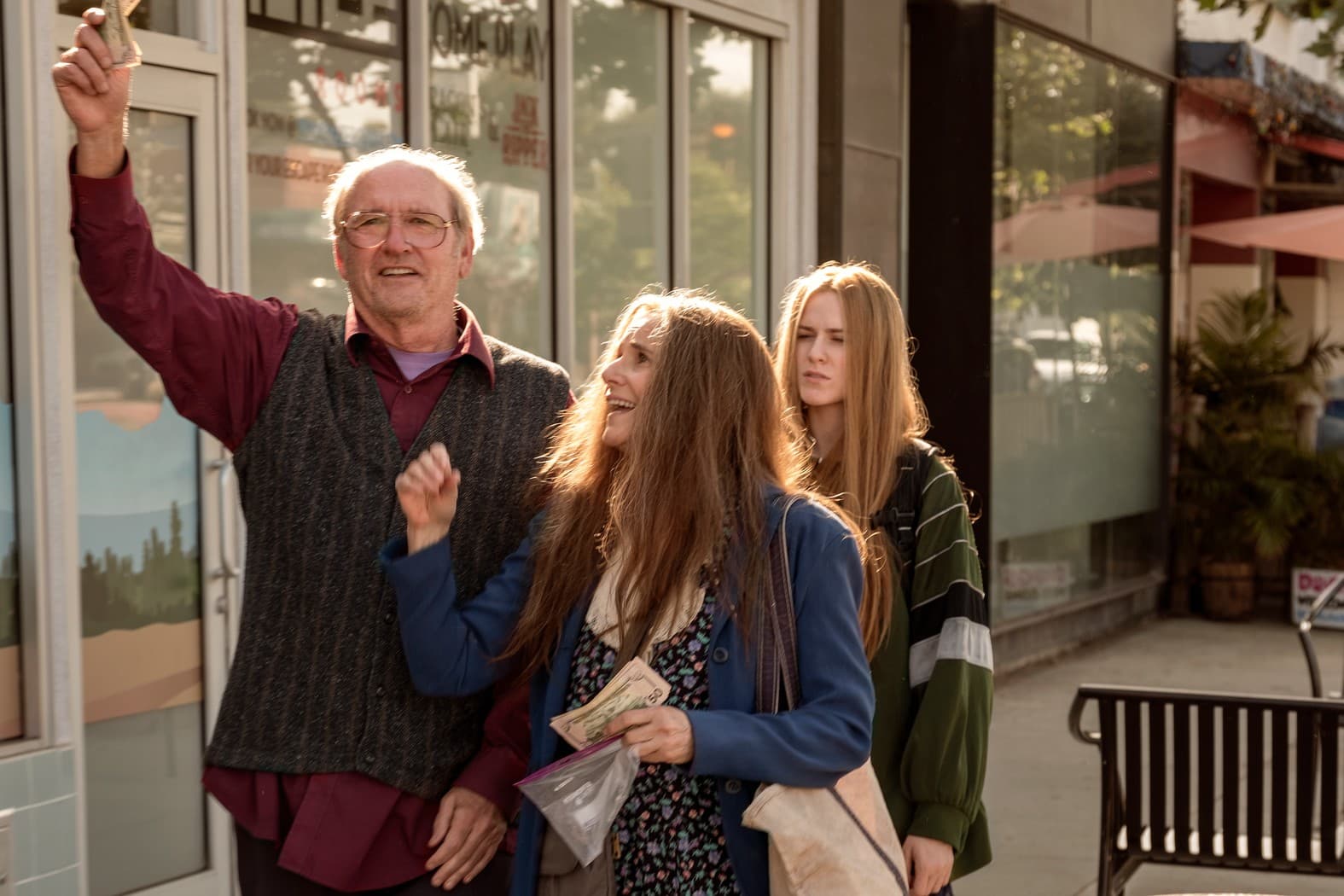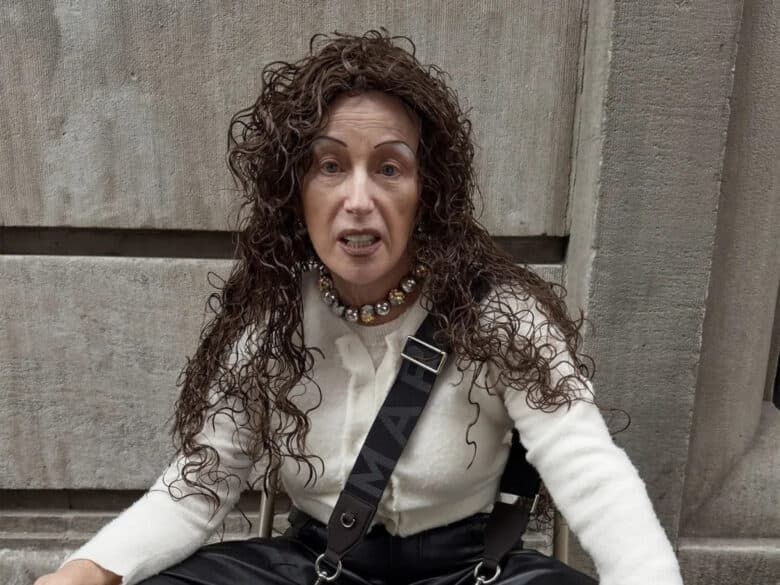Miranda July talks ‘Kajillionaire’, fan fiction and long-haired butches
Some point in the 2010s, we reached a tipping point where the term “lesbian drama” became synonymous with joyless period pieces and a wan-faced sea of cis-het actresses. If only movie execs had actually headed to their local gay bar to see what queer culture looks like, this century. But, thankfully, more contemporary fare is on the menu thanks to writer, artist and director Miranda July, who recently released her third film Kajillionaire to much fanfare.
Focussing on 26-year-old Old Dolio, her lowlife scammer parents, and the culture clash which ensues when all American girl Melanie enters her off-kilter world, Kajillionaire hashes out complex ideas around identity, family and capitalism in a true testament to Miranda July’s fearless filmmaking style. Absurd, antiestablishment and giving us a (much-needed) long-haired butch icon in the form of Evan Rachel Wood, it’s a weird film that reflects our equally weird reality back at us.
Below, we catch up with Miranda to talk family, late-stage capitalism and why you don’t make a movie like Kajillionaire unless you “have a lot of anger towards a parent.”
Let’s start with an easy one, what are you hoping to achieve now that Kajillionaire has been released out into the world?
I have a secret desire that someone writes Melanie and Old Dolio fan fiction. I like to hear, occasionally, what people will think will happen later in the day, after the film ends, for Melanie and Old Dolio.
If we go into another lockdown, I can probably step up to the plate! So, I’d love to hear a bit more about the tension between Melanie, who is so relatable, and Old Dolio’s family, who are kind of self-fashioned outcasts.
I was trying to cast, or just write, a character who I would present as like an avatar for the audience. Like, here we have this oddball family and now here enters America’s sweetheart. A more conventional character who’s just easy to love and familiar in how she talks and what she wears. To me, a modern version of that is Jane the Virgin [the breakthrough television role for Gina Rodriguez, who plays Melanie]. In an older film that might have been a blonde, blue-eyed young woman. To have the family being self-righteous outsiders and her seemingly being more conventional but at the end [it’s evident that] they are very rigid and she’s actually much more radical, even avant-garde. I guess I wanted to mix up who gets to be radical in a movie, how that’s coded.

Definitely, it’s really important that this blonde, blue-eyed heroine stops being the default, or at least stops being the only heroine we ever get to meet. Kind of on that note, I guess, I really loved the queer relationship that blossoms between Melanie and Old Dolio – it’s a butch/femme dynamic that I haven’t seen depicted very often before.
I mean I don’t write autobiographical movies but [my films] are very personal and I’ve been in love with and dated Old Dolios in my life. It’s a kind of woman, not to reduce her, but a long-haired butch icon that I feel should exist. I wanted to see [a character like Old Dolio in a film] and I wanted a beautiful woman to fall in love with her. I didn’t want to discuss any of that in the movie, I just wanted it to be experienced. Old Dolio has not found her people yet, she doesn’t have the language, but she’s still very much herself. I just had a lot of love to give [Old Dolio] and it helped me write that character.
That love really shines out in the film, I think. Moving off into different territory now, do you see any parallels between Kajillionaire and Parasite? For me, the bizarre repetitive actions and half-baked scams in the former seemed to be touching on a similar critique of capitalism as in Parasite.
Yeah, that’s interesting. I was done with the movie when Parasite came out and the very first thing I remember thinking when I got to the end of Parasite was, ‘wow, for all that weirdness and strangeness this is still a movie about incredible family love and loyalty.’ That really moved me and I thought of my own movie and I was like, ‘mine isn’t’. [Family values] might be the thing that gets you to the Oscars. You can do anything you want as long as, in the end, the son is still paying homage to the father and you still have a dutiful child. I’m not sure what they do with the undutiful daughters who fall in love with women. Not sure what happens to us!
I’ll keep you posted! I mean, I also felt like both films also really highlighted the fact that capitalism in itself is really bizarre. These little scams that Old Dolio’s family do for barely any money just remind me of the terrible, soul-destroying jobs so many of us have had…
Right! There was a way in which I also saw the parents in that movie righteously defending their crumbling infrastructure and their way of doing things, when clearly it wasn’t working, but you could never convince them of that. All you could do is do your own thing, like start your own life with your own ideas behind it. But I relate to them as well and have in different periods in life, even the weird things I’ve done to get financing for my movies. Sometimes we’re all at that level.

This move towards “starting your own life” that Old Dolio does, it really made me think of the chosen families and ways of life that queer people are often forced to craft for themselves.
Yeah, I mean, this family really failed Old Dolio and historically families have really failed the Old Dolios of the world. I’m not sure if there’s something about how separate and siloed each family is that allows for a lot of terrible behaviour that can be condoned as “our way of doing things” [to the point where] that’s what “makes” a family. As someone who’s now making my own family, I don’t want to comply or to conform to that. The critique goes deep and it’s a struggle that happens every day.
There’s also a weird paradox because Old Dolio’s family, even though they are what this queer character ends up rebelling against, could be coded as “queer” because of how antiestablishment they are. It makes me think that coding things as queer doesn’t even really mean anything anymore when the world is so upside down.
It’s true, and maybe that’s good. We’re finally embracing that life is weird. We cannot Other certain things. It’s more like we have to realise that it was always [weird], just a certain group of people tried to control it and organise it in a way that benefited them, but that was never the truth.
On a final note, do you have any sympathy for Old Dolio’s parents?
They think they’re loving, you know, in the way they can. But I don’t think you make a movie like this if you don’t have a lot of anger towards a parent. In the end, I am only rooting for Melanie and Old Dolio and I am rooting for them so hard. I feel like I kind of teach the audience if they’re not rooting for Melanie and Old Dolio. I take them to that point [of rooting for them].
Kajillionaire, A Universal Pictures UK Release, is out in cinemas now.

